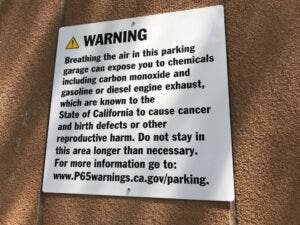Navigating the Complicated Regulatory Waters of Prop 65
Prop 65 is a complex piece of legislation. It mandates companies need to disclose potentially harmful chemicals used in any product sold in California. Let’s dive in and explain what those prop 65 warnings mean, the impact they've had on the environment and public safety, and just how concerned you should be when you find a prop 65 warning label on one of your purchases.
California Proposition 65 is a regulatory law that impacts nearly every product on Earth. And you may have noticed prop 65 warnings on some of your products, even if you don’t live in California.
You’ll usually find a prop 65 warning tucked away inside product literature, buried on a page with other legal mumbo jumbo in a manual, or printed on an easily-misplaced paper insert that ends up getting recycled or binned without so much as a glance. But the notices are around for non-Californians, too. And finding one can be pretty scary at first.
You'll find Prop 65 warnings on all sorts of products, from snack foods to automobiles. And they’re usually pretty intense, too. This product can expose you to chemicals known to the State of California to cause cancer and birth defects or other reproductive harm. It’s enough to make you back away from that product slowly before making a run for the door.
What exactly do those warnings mean? Should we be worried when we see those notices appear on or around the products we buy? Can this pair of sneakers or that bottle of OJ really give me cancer? Just how terrified should I be when I see a sticker prefaced with “California Prop 65 Warning” stuck to the side of a box?
What Is Prop 65?
The Safe Drinking Water and Toxic Enforcement Act of 1986—often referred to as “California Proposition 65” or simply “prop 65”—requires companies to warn consumers of potentially harmful chemicals in products before they’re purchased. It's a state regulatory law, but one that has global reach.
 If a company sells products in the State of California, they’re required to disclose to the public whether those products contain even trace amounts of any of the chemicals identified in California’s prop 65 list of chemicals. And here’s where prop 65 becomes fairly unique in the realm of regulatory laws: it’s not enforced by a government agency, but by the public.
If a company sells products in the State of California, they’re required to disclose to the public whether those products contain even trace amounts of any of the chemicals identified in California’s prop 65 list of chemicals. And here’s where prop 65 becomes fairly unique in the realm of regulatory laws: it’s not enforced by a government agency, but by the public.
Prop 65 is administered by California’s Office of Environmental Health Hazard Assessment (OEHHA), a department of the California Environmental Protection Agency (CalEPA). But the OEHHA and the CalEPA have nothing to do with enforcement.
Instead, the public enforces the law; private citizens, law firms, and consumer advocacy and environmental protection groups who file lawsuits on behalf of the public interest. And those lawsuits almost always win in court, too, driving most companies to settle out of court and avoid costly courtroom losses.
A government agency would struggle to monitor every product being sold on the market. There’s bureaucracy and lobbying and corruption and fraud. But with prop 65 being enforced by the public, it’s a lot harder for companies to skirt justice when they violate the law.
California Proposition 65 was drafted by an environmental lawyer and passed as a ballot initiative—a law enacted by popular vote, rather than politicians—in 1986. Since then, the prop 65 list of chemicals has grown to include more than 900 entries, with thousands of lawsuits filed per year. Amazon alone faces over 1,000 lawsuits regarding products that allegedly violate the law.
A State Law with Global Reach
As you might expect, prop 65 has been endlessly controversial. But there’s a lot of compelling evidence that suggests prop 65 has been massively successful in making people safer and healthier. Not just in California, but globally.
 Prop 65 can be directly credited with a dramatic decrease in the amount of nasty chemicals we consumers are exposed to on a daily basis. The use of dangerous and even toxic chemicals in consumer products has dropped significantly. Air and water quality have improved. There’s simply no denying that our world is a better, safer, cleaner place thanks to the passage of California Proposition 65.
Prop 65 can be directly credited with a dramatic decrease in the amount of nasty chemicals we consumers are exposed to on a daily basis. The use of dangerous and even toxic chemicals in consumer products has dropped significantly. Air and water quality have improved. There’s simply no denying that our world is a better, safer, cleaner place thanks to the passage of California Proposition 65.
Okay, hang on. How can a California State law make the entire world cleaner and safer? Prop 65 has no legal power whatsoever in Texas, or Florida, or Ohio, or New York, or in other countries. So why would it have an impact in those places?
To understand that, you need to first understand that California is practically a global superpower in and of itself. If California split from the United States, its population of 39 million people would rank it 36th out of 234 nations. That’s a bigger population than Canada, Australia, and scores of other countries. And that country of California would boast the fifth largest economy on the planet while also being the eighth most productive country in the world in terms of GDP.
Companies operating on national and global scales don’t want to lose California’s all-powerful consumers. They're all too happy to conform their products to suit those regulations. They reformulate their products, reducing chemical quantities. They reform their manufacturing processes. And yes, they print those little prop 65 warnings on stickers or inside booklets.
Prop 65 Has Its Problems
Of course, you can’t have a law as far-reaching as California Proposition 65 without creating a lengthy series of daunting new hurdles. And the fact that prop 65 is enforced through public litigation has nearly as many drawbacks as it does benefits.
While there’s no denying most prop 65 lawsuits are filed for the right reasons, there have been countless instances of abuse from parasitic legal vultures who prey on companies with frivolous litigation. It’s often cheaper to settle those lawsuits privately than take them to court, empowering those bullies even further.
Thankfully, the laws have changed to largely put an end to those nonsensical lawsuits. But before they were doused, they managed to create a culture of unnecessary preemptive product labeling that still persists today.
Companies put prop 65 warning labels on just about everything. It doesn't matter if their products pose a serious health risk to consumers or not. Those warnings are enough to keep the vultures from circling—they do still exist, even if the number of empty lawsuits has shrunk significantly—and a sticker will always be cheaper than a potential legal settlement.
I Found a Prop 65 Warning. Should I Worry?
 I recently found a prop 65 warning inside the box of a board game I got for Christmas. It was printed on a small paper insert, stacked alongside the game’s warranty and proof of purchase, as well as an advertisement for the company’s other games. This product was purchased in either New York, Pennsylvania, or New Jersey (my Mom does her Christmas shopping in all three states), but a prop 65 warning made its way into the box anyway.
I recently found a prop 65 warning inside the box of a board game I got for Christmas. It was printed on a small paper insert, stacked alongside the game’s warranty and proof of purchase, as well as an advertisement for the company’s other games. This product was purchased in either New York, Pennsylvania, or New Jersey (my Mom does her Christmas shopping in all three states), but a prop 65 warning made its way into the box anyway.
I’m pretty sure the board game my mom gave me for Christmas isn’t going to give me cancer. Neither will my sneakers, or my new headphones, or a bounce house, or a bar of soap. When those warnings show up, I just use some common sense and that’s that.
If you come across a prop 65 warning and find yourself concerned, it’s likely because you don’t know or entirely trust the company in question, or it’s a new product you’re unfamiliar with. And in those cases, it’s probably best to just Google the product, read reviews, and see what others think. The odds of you encountering a dangerous product are pretty slim these days, thanks in no small part to California Proposition 65.
Tent and Table’s Commitment to Safety and Transparency
You may have noticed while browsing our website that unlike most of our competitors, Tent and Table prominently displays prop 65 warnings on our products. You’ll find them on our inflatables—bounce houses, inflatable water slides, inflatable obstacle courses, inflatable games, etc.—our party tents, and other products.
Every product we carry made with polyvinyl (PVC) is accompanied with a prop 65 warning on our website. And we display these warnings at the point of sale, rather than simply hiding them away in a booklet. To us, it’s not just about prop 65 compliance. We like to keep our customers informed. And some people out there do have PVC allergies and sensitivities, too, however rare they may be.
All of our products are free of phthalates, which were banned from use in products for children by the Consumer Product Safety Improvement Act of 2008 (CPSIA). We do our best to always comply with the CPSIA and the Lead Free Toys Act, as well as meeting or exceeding NFPA 701 and CPAI 84 fire codes. Many of our products are compliant with ASTM and CPSC guidelines, too (where applicable, of course).
Fully complying with California Proposition 65 isn’t just something we do to benefit our customers in California. It helps us enhance the safety and quality of our products for everyone. Many of us at TNT are parents. We let our own children use these products. Prop 65 compliance isn’t just a legal thing … it’s a quality thing. And that's why we take prop 65 so seriously. Compliance with California Proposition 65 makes our products safer. Not just for you, but for us, too.


